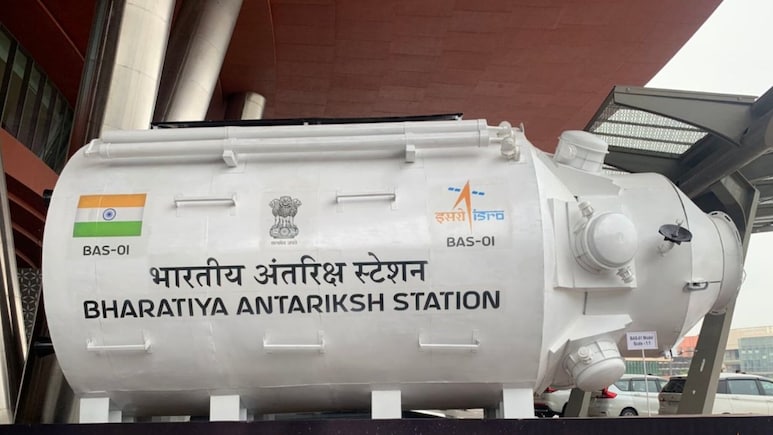
- India plans to launch the first module of its Bharatiya Antariksh Station by 2028
- The BAS will have five modules in orbit by 2035 as part of India’s space ambitions
- The BAS-01 module will weigh 10 tonnes and orbit 450 km above Earth
ISRO on Friday unveiled a model of the Bharatiya Antariksh Station (BAS) module during the two-day National Space Day celebrations that began here.
India plans to launch the first module of the BAS, its own home-built space station, by 2028, marking its entry into the group of a handful of nations that operate orbital laboratories.
Presently, there are two orbital laboratories -- the International Space Station operated by five space agencies, and the Tiangong space station of China.
India plans to have five modules of the Bhartiya Antariksh Station in place by 2035 as part of its ambitious plans for the space sector.
The BAS-01 module is expected to weigh 10 tonnes and will be placed in a low earth orbit at 450 km above the earth.
Salient features of the BAS include, indigenously developed Environmental Control and Life Support System (ECLSS), Bharat Docking System, Bharat Berthing Mechanism, automated hatch system, platform for microgravity research and technology demonstration, viewports for scientific imaging and crew recreation.
The BAS will also have provision for refilling of propulsion and ECLSS fluids, radiation, thermal and Micro Meteoroid Orbital Debris (MMOD) protection, space suits, airlocks to support extra vehicular activity and plug and play integrated avionics.
The BAS is expected to serve as a research platform for studying various aspects of space, life sciences, medicine, and interplanetary exploration.
It will provide an opportunity to study the effects of microgravity on human health and test essential technologies needed for long-term human presence in space.
The space station will support space tourism, with India entering the commercial space sector by leveraging the orbital lab's resources.
The BAS will contribute to ongoing international collaborations and serve as a hub for scientific research and also inspire younger generations to consider careers in space science and technology.
The massive 3.8 meter x 8 meter BAS-01 model was the center of attraction among those attending the National Space Day celebrations at the Bharat Mandapam here.
(This story has not been edited by NDTV staff and is auto-generated from a syndicated feed.)
Track Latest News Live on NDTV.com and get news updates from India and around the world

